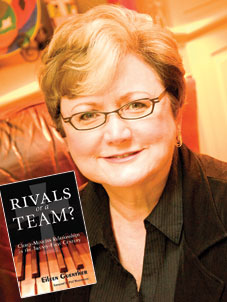By Ronald E. Keener
 ”Whether it is a change in worship style or a change in music, there are significant challenges facing worship leaders today,” says Eileen Guenther in speaking about the collaboration between clergy and musicians. One of those challenges she speaks of in a new book Rivals or a Team? (Morningstar Music Publishers) is how well the pastor and the worship leader get along.
”Whether it is a change in worship style or a change in music, there are significant challenges facing worship leaders today,” says Eileen Guenther in speaking about the collaboration between clergy and musicians. One of those challenges she speaks of in a new book Rivals or a Team? (Morningstar Music Publishers) is how well the pastor and the worship leader get along.
Guenther, associate professor of church music at Wesley Theological Seminary, Washington, D.C., responded to questions from Church Executive:
What is it about the relationship of pastor and musician that engenders conflict?
It often comes down to two issues: a matter of control and a lack of clarity about “who’s responsible for what.” In this regard there are two issues that surface most frequently. The first is choice of hymns, for example. If both parties are used to choosing them in previous employment situations and they don’t talk about the way they want to handle it, there can be conflict at the very start.
Another example is the need for clarity in terms of how far ahead the clergy share the theme for a service (or which Scripture readings will be the main focus of the sermon). Musicians need a certain amount of time to choose (and perhaps order) as well as to rehearse music that will be relevant for a particular service – and finding out what the subject sermon is on Saturday afternoon before Sunday isn’t sufficient.
How can the two start out on the right track when either of them is new to the church?
The key issues in forming a relationship are building trust and respect. This would start in an obvious way — getting to know each other, learning what the other person values in terms of worship and music and discovering how each of them sees their relationship. This takes a commitment of time for regular meetings and personal investment in the relationship, but will pay huge dividends. Initiating these discussions early on will pave the way for a healthy, mutually supportive relationship.
Are there key questions a pastor should ask the musician about music style and worship approach?
Absolutely! Productive questions are basic: In your view, what is the goal of worship? What is the role of music within the service? What is the role of the choir in encouraging congregational singing? How can we work together to enable the most powerful worship in this place? Do you have “hot buttons” that I could avoid?
What should be the end goal of worship music?
For me the goal of worship is “ushering the people of God into the presence of God and sending them forth to do God’s work in the world.” Music makes a difference in the world and it makes a difference in worship. It is “portable theology,” and well-chosen music (especially the final hymn) can send people out of the sanctuary singing the message of the Scripture and the sermon.
Church music isn’t all about rock music and loud drumming today. Is the organ still the predominant instrument among America’s larger churches?
“Add, don’t subtract” is my motto. The organ is very much alive and gives vibrant musical leadership in many churches. It’s not unusual, however, to use piano or drums when the music calls for it. The broader the range of music, the broader the range of instruments! Add instruments to the mix, don’t take them away!
How do you look at music within the church?
The opportunity to affect the spiritual lives of congregations is one to be treasured. Music speaks to our hearts and our souls and, having heard it or sung it, changes us. For music and for its power in worship, I can only say, “Thanks be to God!”


